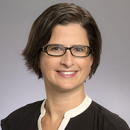
Platelet Dysfunction in Ehlers-Danlos Patients with Bleeding Phenotype
Dr. Mariia Kumskova works at the Dr. Anil Chauhan’s laboratory, Department of Internal Medicine, Hematology-Oncology, University of Iowa. Dr. Kumskova obtained her medical degree from Russian State Medical University. Her professional research career began when she was working as a hematologist at National Research Center for Hematology (Russia). Her area of expertise is mainly focused on bleeding and thrombotic disorders. Since her residency Dr. Kumskova’s work contributed to the investigation of the coagulation status of different bleeding phenotypes in severe hemophilia A, standardizing diagnostic and treatment guidelines for patients with hemophilia, von Willebrand disease, and inherited platelet disorders, consulting patients with the combined bleeding diathesis and thrombotic events.
Dr. Kumskova’s research interests are concentrated on platelet cellular and molecular pathways. In pursue of continuing her study under the mentorship of established platelet field experts she joined The Chauhan Lab at the University of Iowa. Currently, her research is focused on unraveling the grey areas of platelet dysfunction in Ehlers-Danlos syndrome with bleeding phenotype. This innovative study has grown out of her medical practice. Dr. Kumskova believes that combining practical medicine and basic research of Ehlers-Danlos and platelet pathways can be beneficial for both, the research and medical fields.






